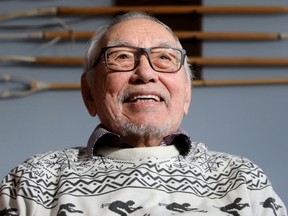Canada’s first Inuk Senator appointed to Order of Canada
Categories: Canada
An electrician by trade, Willie Adams was actively involved in the creation of Nunavut and passionate advocate for the North.
Article content
It’s been nearly 15 years since Willie Adams turned 75, the mandatory retirement age at the Senate. As a passionate advocate for advancing Inuit representation at the federal level, he said he would have worked longer if he could.
As he enjoys retirement from his home in Kemptville, Ont., Canada’s first Inuit senator has become one of the newest officers of the Order of Canada.
Advertisement 2
Article content
Article content
Now 89 years old, mementos of his heritage and his 32 years in the Red Chamber keep him company.
A replica of his red-and-gold Senate chair sits in the corner of the living room. Traditional Inuit hunting arrows hang on the dining room walls.
Adams recalls the stories attached to each item with pride as he looks back on a career of bringing support in education, health care, land claims and affordable housing to the North.
Working in federal politics was not his original trajectory. Adams was born in Fort Chimo — now Kuujjuaq — the largest northern village in Nunavik, Que., and was an electrician by trade.
After settling in Rankin Inlet, a community on the northwest coast of Hudson Bay, he turned to politics as a way to get involved in the community. He served two terms on the Rankin Inlet hamlet council and spent four years as a member of the Northwest Territories Territorial Council.
When then-prime minister Pierre Trudeau decided to hire a Liberal Senator to represent the Inuit in 1977, Adams was recommended as a potential candidate.
Adams, however, was hardly interested in the position at first. “I remember asking, ‘What’s a Senate?’” he said with a laugh. “I’d never seen that on TV or anything.”
Advertisement 3
Article content
He was invited to fly down to Ottawa to meet with Trudeau to discuss the position, but when the trip interfered with his electrician projects, he put the wiring tasks first.
“I had two more houses to finish wiring, and I didn’t want to make the carpenters wait to cover up the walls,” he said. “I went to finish those two houses, then I went to see the prime minister.”
After accepting the position, he said transitioning to the Senate was a challenge — not only was he working alongside many seasoned politicians, but it was also his first time living in a big city.
He quickly got to work to ensure the Inuit had a say in the land claims, mining expeditions, pipelines and infrastructure projects that were happening on their land.
“Our people were here first, thousands of years ago, and I always reminded them of that,” he said.

Adams was actively involved in the creation of Nunavut in 1999, and he advocated for funding education, housing and local government in the new territory.
“Every community now works with the Government of Nunavut to make city regulations — those things weren’t there when I started,” he said. “Nunavut can make its own rules instead of coming in from Yellowknife. Those were the sorts of things that came from my work in the Senate.”
Advertisement 4
Article content
He also opposed the Liberal Party’s bill to restrict firearms in 1995, due to its conflicts with traditional Inuit hunting practices. Despite being one of the few Senators in opposition, he continued to advocate for his people’s livelihoods.
“It was difficult sometimes, fighting for my people,” he said.
Mary Hands, Adams’ wife of 46 years, described him as a hard worker who always put the needs of his community before his own.
“He brought the North to the Senate,” she said. “He was not quiet about the North. There’s enough people talking about Toronto and Ottawa, but he’d talk about the North.”
“If people would say something incorrect, he would correct them so that they would know what the right term was,” Hands said. “When Iqaluit came in, people would mispronounce it — they’d put an extra ‘u’ in there. So, he’d kindly say it correctly.”
When Adams retired from the Senate in 2009, he was its longest-standing current member, serving a total of 11,767 days.
As a self-proclaimed family man, he said he can’t wait to celebrate his Order of Canada appointment with those he holds close.
Related Stories
Article content


